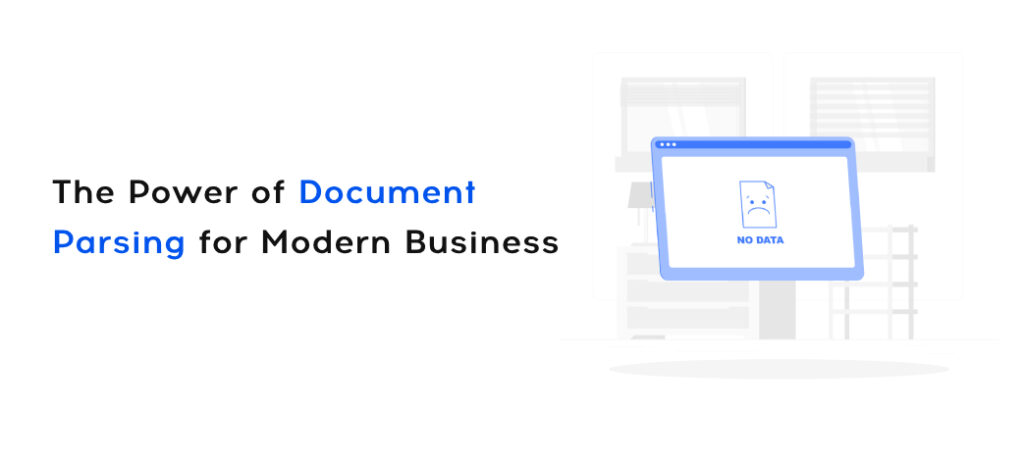
Document parsing is a crucial technology in today’s data-driven world. It involves extracting information from structured or unstructured documents, such as PDFs, Word files, or HTML pages, and converting it into a machine-readable format. This process is invaluable for various industries and applications, helping businesses automate data entry, improve data accuracy, and enhance operational efficiency.
Applications of Document Parsing
Document parsing is used in a wide range of industries and tasks. Here are some examples:
- Financial Services:
- Invoice Processing: Automating the extraction of key details like invoice numbers, dates, and amounts from PDF invoices.
- Bank Statement Analysis: Parsing monthly statements to track expenditures and balances.
- Healthcare:
- Medical Record Management: Extracting patient information, medical history, and treatment details from various document formats.
- Insurance Claims: Automating the processing of claim forms to expedite approval processes.
- Legal:
- Contract Analysis: Parsing lengthy legal contracts to identify key clauses, dates, and parties involved.
- Case Management: Organizing and extracting information from legal documents for case tracking.
- Real Estate:
- Lease Agreements: Extracting tenant information, lease terms, and payment schedules.
- Property Listings: Parsing property details from various listing services to create unified databases.
- Human Resources:
- Resume Screening: Automating the extraction of candidate information from resumes.
- Compliance Documentation: Ensuring all employee documents meet regulatory requirements.
Challenges in Document Parsing
While document parsing offers significant benefits, it also presents several challenges:
- Maintaining Document Structure:
- Extracting text while preserving formatting such as paragraphs, fonts, and styles can be difficult, especially in complex documents like PDFs.
- Handling Diverse Formats:
- Different document types (PDF, DOCX, HTML) have unique structures and require specialized parsing techniques.
- Performance and Scalability:
- Parsing large volumes of documents efficiently and within a reasonable timeframe.
Our Solution to Document Parsing Challenges
Our development team faced these challenges head-on, particularly focusing on maintaining the style and structure of paragraphs in parsed documents. Here’s a detailed look at how we tackled the issues:
Main Problem: Parsing Paragraphs with Style Preservation
- PDF Parsing:
- Challenge: Retaining paragraph styles from PDFs is complex because text is often split into lines, losing the original paragraph structure.
- Solution: We experimented with various tools and scripts, including Python scripts and
pdftohtml, to convert PDFs into HTML while attempting to maintain the style. However, these methods often fell short in preserving paragraph integrity and styling.
- DOCX Parsing:
- Challenge: Extracting data while retaining the correct structure and style of the text, including nested lists.
- Solution: We tested different approaches and finally settled on using the Aspose.Words Parser. This tool proved effective in breaking down DOCX documents into paragraphs with minimal loss of style. Additionally, it could handle nested lists accurately, which was a significant advantage.
Technical Implementation:
- By integrating Aspose.Words into our parsing workflow, we were able to:
- Convert DOCX files into HTML or other desired formats while maintaining the original document structure.
- Extract text along with its formatting, ensuring that the output was both accurate and visually consistent with the original document.
- Handle nested lists and complex formatting scenarios efficiently.
Conclusion
Document parsing is an essential technology for businesses looking to automate data extraction and improve operational efficiency. Despite the challenges, our solution using Aspose.Words has allowed us to achieve high accuracy in parsing documents while preserving their styles and structures. This advancement not only enhances the quality of our data extraction processes but also saves time and resources, enabling our clients to focus on more strategic tasks.
By leveraging advanced tools and continuously refining our techniques, we ensure that our document parsing capabilities meet the evolving needs of our clients across various industries.
If you have a specific task related to document scrapping –>
Schedule a call to discuss your case